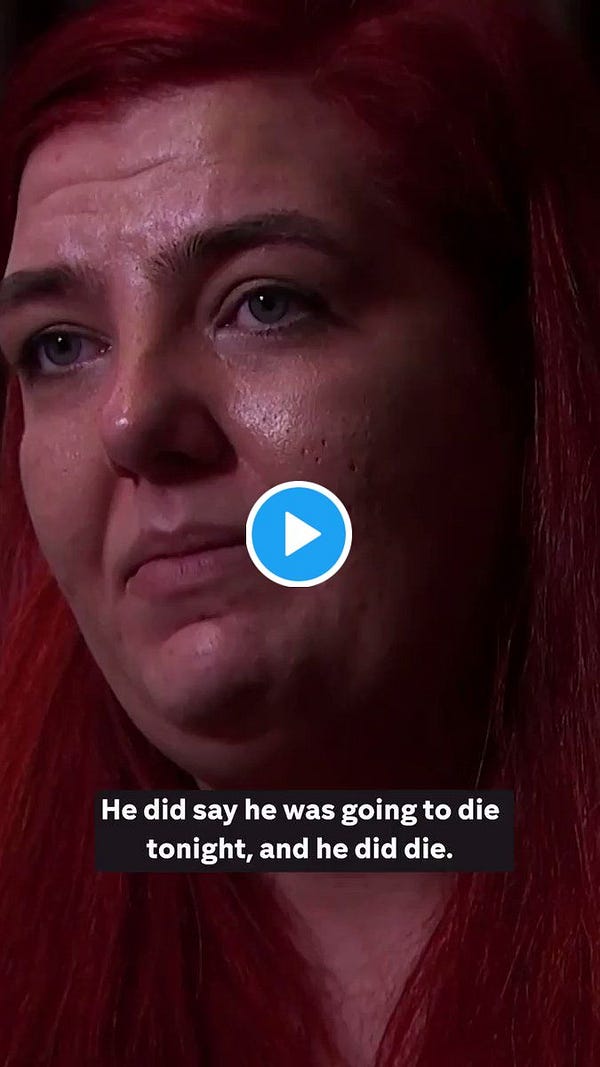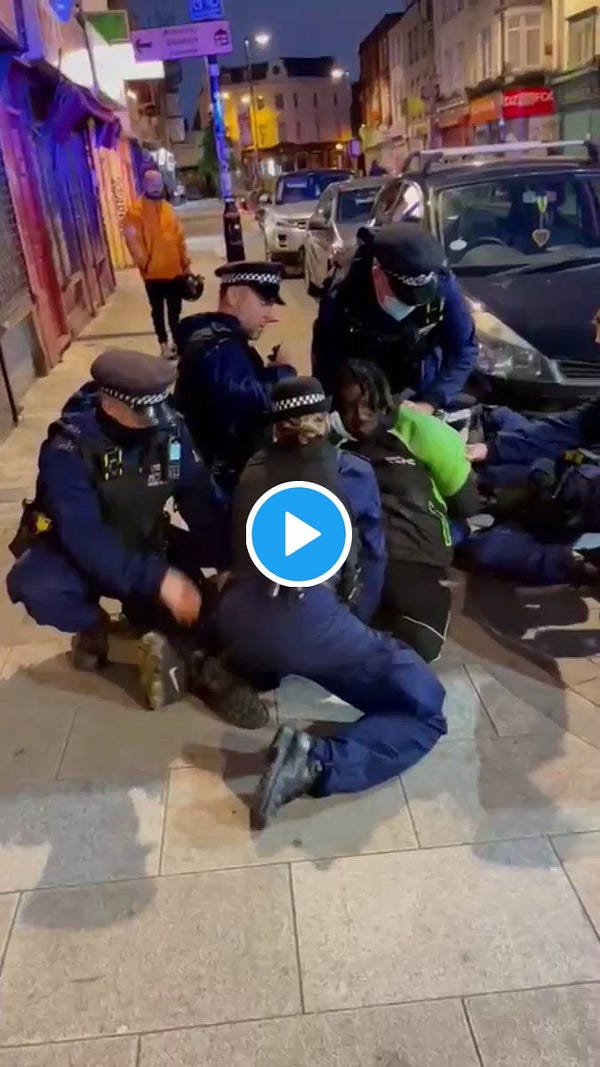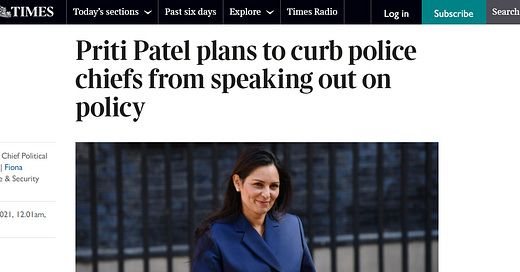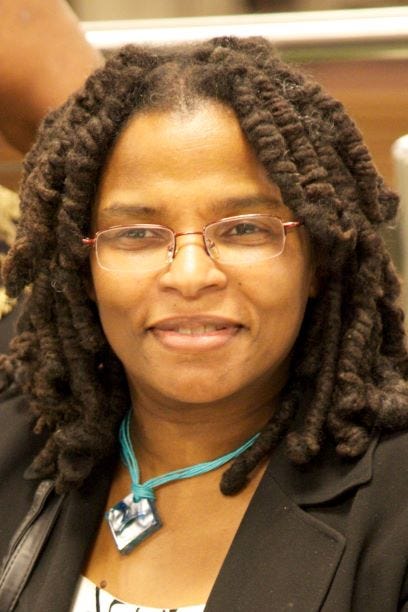June 2021: Zap 'em
Home secretary calls on police to ‘zap’ the bad guys – but not to highlight the danger to Black people of encouraging trigger happy officers
Dear StopWatchers,
Much like this time last year, June has been a historic month for justice in response to police brutality, on both sides of the Atlantic. In the United States, George Floyd’s murderer was sentenced to 22-and-a-half years, while in the UK one of the officers involved in the manslaughter of Dalian Atkinson was given eight years. Both instances are reminders that sometimes, the criminal justice system can deliver some accountability.
There is potential trouble on the horizon though, with the Police, Crime, Sentencing and Courts Bill still making its way through parliament. You can read our response to the expansion of stop and search in proposals for Serious Violence Reduction Orders here. We also spoke about the Freedom of Information requests exposing a lack of effort among forces to deal with complaints of racist police conduct and scrutiny panels lacking diversity.
And we’ll be making our voice heard more often now we have a new executive director in place, Dr Deborah Sangster.
Dr Sangster brings a wealth of experience from a number of Black led voluntary sector organisations in both West Yorkshire and the East Midlands, in addition to social work, youth work and community development practice.
Topics in this newsletter include:
Home secretary calls on police to ‘zap’ the bad guys as the country’s biggest force is mired in institutional corruption
The trial of the officers involved in Dalian Atkinson’s killing reaches a historic verdict – a second person dies at the hands of South Wales police this year
And in Terrible tech, the information commissioner does the job of the new biometrics and surveillance commissioner for him
Please enjoy our roundup of stories below.
The ‘first objective was to protect itself’
The Police Federation of England and Wales – the ‘trade union’ it’s okay for officers to be a part of – held its annual conference in 09-10 June, and given Patel’s desire to ingratiate herself with the rank-and-file membership in her keynote speech, it was inevitable that she might say something controversial.
The particular use of the word ‘zapping’ in the month that a jury contemplated the verdict of a police officer accused of unlawfully killing ex-Premier League footballer Dalian Atkinson (which involved the use of a TASER) seemed especially insensitive.
Yet, judging from her words, and subsequent policy plans reported in the Times (£wall), you would never think Patel was interested in righting the wrongful behaviour of cops or problematic police legislation. Or even allowing anyone to speak about it.
The home secretary’s concerns indicate the measure of control she wishes to exert over the force, perhaps to avoid the embarrassment of admitting things like there being ‘the occasional “bad ’un” within the ranks of the Metropolitan police service’, as chief Cressida Dick told the Women’s Institute (Guardian, 08 Jun).
Dick’s remarks are a huge understatement compared with other frank admissions made in the same month:
Institutional racism in Met ‘worse now’ than after Macpherson inquiry, says former officer (Channel 4 News, 01 Jun)
Asked if institutional racism existed in Bedfordshire Police, Chief Constable Forsyth said: "I do, yes. There’s a lot of evidence of that." (Bedfordshire Live, 11 Jun)
We imagine that the home secretary would rather police chiefs nix any sign of weakness in the force. And the chief constable of Greater Manchester Police would like you to know that there is nothing weaker than taking the knee (Manchester Evening News, 14 Jun):
On whether he would take the knee in uniform, Mr Watson told The Daily Telegraph: “No, I absolutely would not. I would probably kneel before the Queen, God, and Mrs Watson, that’s it.”
Such attitudes suggest grievances about institutional racist and sexist policing will continue to be met with indifference and inaction, sometimes in the name of neutrality.
This is includes the fact that the British Transport Police were found to be ‘six times more likely to use force on Black people’ compared with White people (BBC News England, 17 Jun), while three in every four domestic abuse cases in England and Wales fail to bring charges (Sky News, 23 Jun).

The findings of the independent report into the murder of Daniel Morgan allow us to add the charge of institutional corruption to the litany of charges laid before the police.


However, there are fears that calls coming from all sides to change for the better will continue to fall on deaf ears too. Why? Because, to quote the report panel, on having to confront its many failings since Morgan’s death, ‘the Metropolitan Police’s first objective was to protect itself’. Former Met commissioner Sir Ian Blair’s defence of the force the day after the report’s release proved so (BBC Radio 4, 16 Jun).
So it’s hardly surprising when forces still fail to attract black and ethnic minority candidates (Police Professional, 11 Jun), or when police panels set up to scrutinise stop and search incidents are found to contain few or no members from minority ethnic backgrounds (Guardian, 13 Jun).
Ultimately, the denial of police chiefs and the home secretary to admit or face up to the institutional problems of policing will leave the impression that the police do not protect certain types of people in our society. More zapping is not an answer to their problems.
Deaths from police contact, cases old and new
Dalian Atkinson
Police constable Benjamin Monk was sentenced to eight years for the manslaughter of the former Premier League forward at Birmingham Crown Court, the first time an officer has been convicted of the charge in England and Wales in 35 years (INQUEST, 28 Jun). The jury did not reach a majority verdict on the charge of Actual Bodily Harm against another officer involved in the fatal incident, Mary Ellen Bettley-Smith.
Speaking for the West Mercia force, assistant chief constable Rachel Jones told the Shropshire Star (23 Jun):
We do not underestimate the impact of this case and the verdict. It is wide-reaching and immeasurable. Nor do we underestimate the significant damage that it has done to the trust and confidence in the police locally and nationally, particularly to Black people. It causes grave concern within the police service.
Andrew Hall
A reminder of the rarity of the Atkinson verdict is demonstrated by the circumstances surrounding the death of Andrew Hall, who was restrained by police for two hours. His partner Natalie believes race played a role in the officer’s actions (23 Jun).


Richard Collier
The partner of a man who was shot by an officer at a Romford petrol station in 2018 has demanded a fresh investigation into the Met police after one of the two civilian eyewitnesses to the incident claimed false information was inserted into her police statement (Romford Recorder, 24 Jun).
‘There should be an investigation into all this,’ Melissa Collier said. ‘What they’ve done is not right. You can’t change people’s police statements.’ Local MPs Andrew Rosindell and Jon Cruddas supported her claims.
However, the Met said it would not refer itself because the coroner had not asked it to. A spokesperson said: ‘There was no fresh evidence heard at the inquest into the circumstances surrounding the death of Mr Cottier which would warrant us to re-examine the findings from our investigation… We have received no recommendations from the coroner regarding evidence given to the inquest and therefore will not be self-referring to the IOPC.’
Jermaine Baker
The public inquiry into the fatal police shooting of Jermaine Baker found that he was asleep when he was shot, and that no firearm was found in the car in which he was front seat passenger, but one was discovered in the back (Police Professional, 16 Jun).
Outlining the Baker family’s position, Phillippa Kaufmann QC said: ‘Margaret [Jermaine’s mother] is categorically and unequivocally clear that whatever Jermaine was doing on December 11 2015 he should not have paid with his life, that his death was entirely unnecessary and unjustified, and that it was the result of truly reprehensible failings on the part of the police officers involved.’ She added that the police operation was ‘botched and unprofessional’.
Unknown
The Independent Office for Police Conduct (IOPC) investigation into the death of a 30-year-old man following police contact in the Pentwyn area of Cardiff has found that he was ‘restrained and handcuffed’ before emergency services were called to the scene (voice.wales, 21 Jun).
The man was then taken to the University Hospital of Wales where he was pronounced dead at 2:30am.
It is the second death of a man at the hands of South Wales police in 2021. The IOPC is also investigating the circumstances surrounding the death of Mohamud Hassan in January 2021, with officers served misconduct notices still on patrol.
Other news
Police take pride in restricting freedom of speech: A director of a ‘queer, yiddish’ café in Glasgow is facing a criminal charge after ‘complaints from the public regarding an item displaying offensive language’ on the café premises (Jewish Times, 17 Jun).
One of the directors, Morgan Holleb, 32, has since been charged by officers with alleged breach of the peace. During Pride Month.
Police brutality caught on camera: Fuller description. A Black Uber Eats rider was forcefully restrained and arrested after collecting an order in Deptford, then held in a cell for 16 hours before being released (News Shopper, 24 Jun). Levi Scott was setting off from Morleys on Deptford High Street to complete the final job of his 12-hour shift when he was approached by two officers who said they had seen him cycling on the pavement.
Video shows that by the time he was handcuffed, six officers were present and involved in Scott’s arrest. After a police review of CCTV footage of the incident, he was released without charge. Scott is lodging an official complaint with the Met, alleging officers racially profiled him.


Superintendent Meddle: A police force's head of professional standards meddled in two investigations involving her friends, a disciplinary panel has been told (BBC News Tees, 23 Jun).
Superintendent Bev Gill, of Cleveland Police, is accused of tipping off detective inspector Simon Hurwood about allegations of a sexual nature made against him, allowing him to ‘effectively threaten’ the complainant her.
She is also accused of intervening in an inquiry after a senior officer lied about injuries from a love rival. Supt Gill is charged with gross misconduct but denies the claims.
The UN tells the UK ‘you are not innocent’: A report on racial justice in the aftermath of the murder of George Floyd has called on member states including the UK to end the ‘impunity’ enjoyed by police officers who violate the human rights of Black people (Guardian, 28 Jun).
Featuring seven examples of deaths involving police, including the case of Kevin Clarke, the United Nations human rights office analysis of 190 deaths across the world concluded that law enforcement officers are rarely held accountable for killing Black people due in part to deficient investigations and an unwillingness to acknowledge the impact of structural racism.
Section 60 watch*
London
Greenwich (03 Jun), Hillingdon (15 Jun), Hounslow (07 Jun), Islington (15 Jun), Kensington & Chelsea (23 Jun), Lewisham (01 Jun), Milton Keynes (21 Jun), Wandsworth (19 Jun)
Thames Valley
Banbury (15 Jun), Milton Keynes (24/25, 26 Jun), Oxford (03 Jun), Slough (11 Jun)
Greater Manchester
Preston (14 Jun)
Merseyside
Huyton (14 Jun)
* This is not a comprehensive list
Terrible tech – TASERS won’t save Black lives
While certain police forces proudly unveiled new gadgets (Police Professional, 11 Jun), we were reminded that no institution can be trusted with bigger and more powerful toys without scrutiny or independent oversight.
The new TASER model issued to UK police forces just last year was reported to be more powerful and less accurate than the version involved in the killing of ex-Premier League footballer Dalian Atkinson. And as we noted in December 2020, the fact that the police use force six times more often on Black people than White people, and that TASERS have become the fastest rising use of force tactic since Atkinson’s death, raises suspicion about police perceptions of Black people’s behaviour. For all the rhetoric about how the lethal devices ‘are life-savers actually’, one fundamental question remains: how can a Black person trust their life is not in danger when faced with member of an institutionally racist force armed with a TASER?
However, we must understand that more than the instrument itself, excessive force was a key factor leading to Atkinson’s death, and all the use of force training in the world won't stop the risk of its excessive use stemming from a racist perception of Black people’s physicality. TASERS won’t save Black lives.
Facial rec is ‘supercharged CCTV’
The information commissioner (ICO) is quoted in Police Professional doing the job of the surveillance commissioner in calling out potential misuse of controversial live facial recognition technology, which is under the spotlight ‘over fears it may invade people’s privacy, be used to create watchlists, as well as questions about algorithm bias and whether they could create unfair treatment of individuals’ (18 Jun).
Elizabeth Denham also warned that it is possible that CCTV cameras could be overlaid with live facial recognition systems and even combined with social media data.
The ICO has published an opinion report detailing the extensive concerns and legal issues that organisations should be aware of before using the technology to automatically collect biometric data in public areas, both public and privately owned, such as parks and shops.
While it did not focus on law enforcement usage, the report found uses such as generating biometric profiles to target people with personalised advertising that neither fully justified their usage nor were fully compliant with the requirements of data protection law.
‘While this technology is developing and not widely deployed, we have an opportunity to ensure it does not expand without due regard for data protection,’ Denham said. ‘We’re at a crossroads right now, we in the UK and other countries around the world see the deployment of live facial recognition and I think it’s still at an early enough stage that it’s not too late to put the genie back in the bottle’.
StopWatch is a volunteer led organisation that relies on the generosity of trusts and grant funders to operate. We DO NOT accept funding from the government or police as we believe this would compromise our ability to critically challenge.
We appreciate regular donations via standing order, if you’d like to pledge your long-term support. Details are:
CAF Bank – Registered office: CAF Bank Ltd, 25 Kings Hill Avenue, Kings Hill, West Malling, Kent, ME19 4JQ
Account Name: StopWatch | Sort Code: 40-52-40 | Account Number: 00027415
—
Stay safe,
StopWatch.






